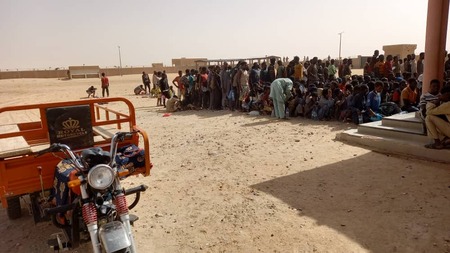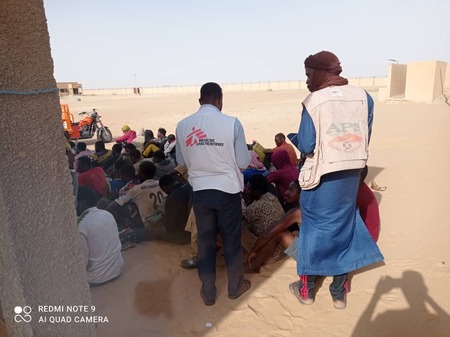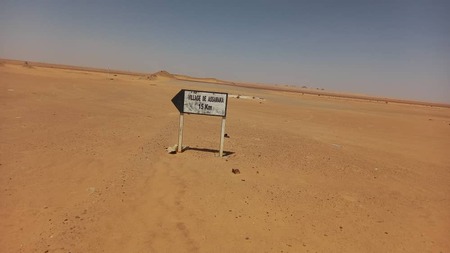At least 5,012 people deported from Algeria to Niger from 26 July till 18 October 2023

People deported from Algeria to Niger in Assamaka, September 2023
©Alarme Phone Sahara
Since the coup d'état of 26 July 2023, the population of Niger has been living in a situation of precariousness and uncertainty imposed by sanctions and threats of war from ECOWAS, and travel to other countries in the region has also been severely restricted. Nevertheless, the Algerian state continues to deport people in large numbers to Niger and the border area in the desert.
According to observations by the Alarme Phone Sahara team at Assamaka, on the Niger-Algeria border, at least 5,012 people deported from Algeria, the vast majority citizens of Niger and other sub-Saharan African countries, have arrived since the coup d'état up to 18 October 2023. With these figures, the number of people deported from Algeria to Niger since the beginning of 2023 rises to at least 24698.
In September and October, the number of deportations rose massively again, following a brief drop in the weeks after the putsch in Niger, and it is to be feared that this trend will continue in view of the political situation in the Maghreb countries.
Migrant hunts, mass pushbacks and disregard for human rights in North African countries. Chain deportations as far as Niger.
The deportations from Algeria to Niger are part of a wider scenario of migrant hunts, mass deportations and systematic human rights violations, including acts of killing and leaving people to die, in all the countries of North Africa.
In July 2023, the attention of world public opinion was briefly drawn to the mass deportations from Tunisia to the Libyan and Algerian borders, during which it was proven that several people were cruelly killed in the desert while dying of thirst.
This practice of pushbacks continues to this day, and many of the people who found themselves stranded in Niger after being deported from Algeria report that they were already in Tunisia beforehand and had been deported from there to the Algerian border.
This bears witness to a chain of pushbacks and deportations contrary to human rights, from Tunisia to Niger via Algeria.
Some people have already experienced an odyssey to Morocco or taken refuge in Algeria after a period of inhumane detention in Libyan prison camps, before finally being deported to the Niger border.
All these practices are largely encouraged by the externalisation of the border regime by the EU Member States, which, through their so-called CEAS reform, want to externalise asylum procedures at their external borders and are currently working, among other things, on an agreement with Tunisia to push back migrants, an agreement that they want to extend to other states.
Stranded in Niger, migrants appeal to their governments to help them leave
Thousands of migrants and refugees are currently stranded in Niger. Faced with the current situation, many of them are unable to continue their journey or return to their own countries.

Doctors without Borders and Alarme Phone Sahara
assisting people deported from Algeria to Niger in Assamaka. ©Alarme Phone Sahara
Even before the coup d'état in Niger, IOM evacuation transports from Assamaka were operating very slowly. IOM points out that, following the reactions to the coup d'état, several of Niger's borders with neighbouring countries have been closed. In addition, the current closure of Niger's airspace, decreed to protect against the threat of military intervention by ECOWAS, means that it is currently impossible to evacuate by air people who decide to return to their country of origin.
This is creating an extremely distressing situation for people who have been stranded for longer in the small town of Assamaka in the middle of the desert, but also in Arlit, Agadez and other places in Niger where refugees and migrants are also living in extremely precarious conditions in IOM and UNHCR camps, in migrant ghettos or even on the streets.
On several occasions, migrants and refugees, outraged by delays in returns to their countries of origin, have reacted with demonstrations in front of IOM premises, including on 7 August in Assamaka and on 12 September 2023 in Agadez.
Others launched appeals to the governments of their home countries, which we document below:
Statement by young Cameroonian migrants deported to Assamaka, 14.09.2023:
"We are young Cameroonians, migrants. Most of us were taken from Tunisia, others from Algeria, others left from Morocco, where they were trying to cross to Tunisia. (...) But we were pushed back. And after we were pushed back, we ended up here in a centre for migrants from Niger in the town of Assamaka. At the moment it's unbearable because it's so hot. We are aware that the people who receive us in the centre are doing the best they can, but this video is a cry of alarm to our authorities, in particular the President of the Republic of Cameroon, to make him understand that we are reaching out to him, and we really hope that this video will arrive safely.
There are nearly 90 of us from Cameroon. Our main aim is to get home, especially given the current instability in Niger. We're afraid that the situation will catch fire and that we won't be able to get back, because we've been told that land and air routes are blocked.
So this video is really to address our authorities. To the Ministry of Foreign Affairs (...). We are addressing this office and also the President of the Republic, Mr Paul Biya. We are asking him to find the necessary channels to send a plane to pick us up here. So that we can be transported to Arlit, given that there is an airport there.
(...) We have nothing against Niger, it's a country of friends and brothers. And for us, the most important thing is really to find the necessary channels to get back (...)".
Words of Malian migrants stranded in Arlit after arriving in Algeria on 26 or 27 March 2023 and being deported to the Niger border between 13 and 18 April 2023, message dated 26 September 2023 :
Person 1:
"My brother, I'm asking you to help us, because I'm not speaking for myself alone, I have friends here who are in the same situation, they're not looking for anything, just to go home. They're traumatised, sick, desperate, everything.
We don't have any care here, we're in a desert where nothing works. Whether it's food, drinking water or hygiene, it's simply that nothing works (...).
That's why we decided to go back home. Because many of our friends have returned to Algeria. Even today there are people returning to Algeria, many, many of them. But if you see that we've decided to return home, it's to go and do something. All the difficulties we had when we went on adventures, all the mistreatment, all the torture we suffered, that's why we decided to go back home. But if you don't have the means, the first thing to do is go back home. (...)
So that's why I'm begging you: on my own behalf, on behalf of my friends, to do everything you can to help us get back home (...)".
Person 2, Hamidou Baté :
"(...) With everything we went through [in Libya], torture, slavery and everything, we didn't manage to cross the sea, our goal wasn't achieved. We tried to escape from Libya to Algeria, we wanted to work a bit. (...) On the 27th day of the month of Ramadan we were deported, the 1st village was Assamaka on the border with Algeria. (...) 3 months nothing goes. Now we're in Arlit. There are 3,000 or 4,000 people in the Campo, and I'm talking about Malians (...) We've suffered too much, we've decided to go home. That's why we're looking for help. (...) Some people are not doing well here, mentally and physically. They've lost their mentality, they've lost their mental health. (...) I have a lot of friends, it's the same thing."
Person 3:
"The situation means that I can't afford to go back to Mali. When I was in Tamanrasset on Algerian territory, I still didn't want to go back. But here, if I have the power, I'll go back home, otherwise I'll have to go back to Algeria (...).
For that, I need help, because I have nothing. I was in Libya, with the civil war there, and that's why I left Libya to go to Algeria. And that's where they caught me. I entered Algeria on the 7th day of Ramadan, and on the 23rd or 27th day of Ramadan they caught me and repatriated me. To this day, I haven't returned, I haven't arrived home in Mali. And they're keeping us here, nothing's going well, with the problem in Niger getting worse every day. We've found some people, they've been here since the end of December 2022. So far they haven't had a chance to go home, you see (...)".
Person 4:
"You see, it's less than 3 months that we've been here in the Campo. (...) We ourselves have been arrested, we were arrested in Algeria on the 23rd of the month of Ramadan."
Person 5:
"At the moment, I'm in Arlit, Niger. We were arressted in Algeria, for migration. We've been here in Niger for over 6 months. It's been 3 months in Assamaka and then here, it's been less than 3 months, because it's been two months that we've been here, it's been two months and 28 days, there are two days left to complete 3 months here."
In view of the precarious situation of the people stranded in Niger, Alarme Phone Sahara demands :
- An immediate halt to all deportations from Algeria and other countries to Niger!
- An immediate halt to mass pushbacks, mass deportations, migrant hunts and all kinds of human rights violations in the Sahel-Saharan region!
- Humanitarian aid, accommodation and care for migrants and refugees in Niger must be guaranteed and not suspended because of sanctions against Niger!
- In addition to the IOM initiative for a humanitarian corridor for the return of migrants to their countries of origin, Alarme Phone Sahara is also calling for evacuation and resettlement programmes for people stranded in Niger to other countries!
- A peace solution for Niger and its neighbouring countries, which would also restore freedom of movement in the Sahel-Saharan region and create secure travel and escape routes!
- No to sanctions and threats of war against Niger! Instead, we need solutions that guarantee the right of the people of Niger to manage their own socio-political future!
Annex: figures for people deported from Algeria to Niger between 14 September and 13 October 2023, according to the Alarme Phone Sahara team in Assamaka

Point Zero, border zone between Algeria and Niger near Assamaka.
Where people are left after being deporten in unofficial deportation convoys.
©Alarme Phone Sahara
14.09.2023: 103 deportees in an unofficial deportation convoy arrive in Assamaka, including one woman, 2 under-age girls, 2 under-age boys and 98 men.
The largest groups of deportees were 28 Guineans and 25 Gambians. Besides them, there were 2 nationals of Burkina Faso, 8 from Senegal, 5 from Cameroon, 13 from Mali, 6 from Nigeria, 4 from Benin, 11 from Chad and one person from Sierra Leone.
14.09.2023: Arrival of an official deportation convoy with 258 people, including 2 women, and 256 men.
17.09.2023: 176 people deported in an unofficial deportation convoy arrive in Assamaka, including 20 women, 5 underage girls and 145 men.
The largest groups of deportees were 74 Guineans and 30 Gambians. Besides them, there were 11 nationals from Senegal, 14 from Mali, 23 from Nigeria, 2 from Benin, 8 from Côte d'Ivoire, 5 from Sierra Leone, 3 from Bangladesh, 2 from Sudan, 2 from Yemen, one person from Chad and one from Niger. The Bangladeshis and Yemenis were immediately sent back to Algeria.
19.09.2023: Arrival of an official deportation convoy with 319 people, including 2 women, 4 under-age girls, 13 under-age boys and 300 men.
02.10.2023: 406 deportees in an unofficial deportation convoy arrive in Assamaka, including 34 women, 12 underage girls, 44 underage boys and 316 men.
The largest groups of deportees were 202 Guineans and 113 Malians. Besides them, there were 24 nationals from Senegal, 16 from Nigeria, 4 from Benin, 18 from Côte d'Ivoire, 11 from Sierra Leone, 7 from Chad, 4 from Burkina Faso, 5 from Cameroon, one person from Ghana and one from Guinea Bissau.
04.10.2023: Arrival of an official deportation convoy with 254 people, including 4 women, 9 underage girls, 8 underage boys and 233 men.
The deportees included 222 citizens of Niger and 32 nationals of other countries, including 21 from Burkina Faso, 7 from Guinea Conakry, 2 from Mali, one from Nigeria and one from Sudan.
06.10.2023: 132 deportees in an unofficial deportation convoy arrive in Assamaka, including 10 underage boys and 122 men.
The largest groups of deportees were 31 Malians, 25 Guineans and 23 Gambians. Besides them, there were 21 Senegalese nationals, 12 from Burkina Faso, 2 from Benin, 11 from Côte d'Ivoire, 5 from Cameroon, one person from Ghana and one from Nigeria.
11.10.2023: 925 deportees in a large unofficial deportation convoy arrive in Assamaka, including 23 women, 10 under-age girls, 3 under-age boys and 889 men.
The largest groups of deportees were 259 Malians and 297 Guineans. Besides them, there were 100 nationals of Gambia, 138 from Senegal, 3 from Burkina Faso, 8 from Benin, 49 from Côte d'Ivoire, 17 from Cameroon, 5 from Ghana, 12 from Nigeria, 26 from Sierra Leone, 4 from Liberia, 3 from Togo, 3 from Sudan and one person from Chad.
13.10.2023: Arrival of an official deportation convoy with 627 Niger nationals, including 20 women, 40 underage girls, 36 underage boys and 531 men.
18.10.2023: 1,133 deportees in a large unofficial deportation convoy arrive in Assamaka, including 30 women, 10 underage girls, 34 underage boys and 1,059 men.
The largest groups of deportees were 328 Malians and 375 Guineans. Besides them, there were 162 nationals of Gambia, 93 from Senegal, 43 from Burkina Faso, 16 from Benin, 37 from Côte d'Ivoire, 11 from Cameroon, 21 from Nigeria, 19 from Sierra Leone, 26 from Liberia, 3 from Togo, one from Ethiopia and one from Somalia.

